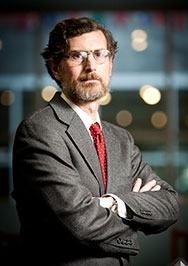Newsroom Archive
 Professor Jonathan Jacobs, Chair of the Department of Philosophy and Director of the Institute of Criminal Justice Ethics, will join distinguished scholars, historians and thought leaders to discuss how Magna Carta’s political and legal traditions have carried into our current times at a symposium on December 9 at the Library of Congress in Washington, D.C. The symposium, "Conversations on the Enduring Legacy of the Great Charter," is being held in conjunction with the Library’s "Magna Carta: Muse and Mentor” – a 10-week exhibition that commemorates the 800th anniversary of Magna Carta.
Professor Jonathan Jacobs, Chair of the Department of Philosophy and Director of the Institute of Criminal Justice Ethics, will join distinguished scholars, historians and thought leaders to discuss how Magna Carta’s political and legal traditions have carried into our current times at a symposium on December 9 at the Library of Congress in Washington, D.C. The symposium, "Conversations on the Enduring Legacy of the Great Charter," is being held in conjunction with the Library’s "Magna Carta: Muse and Mentor” – a 10-week exhibition that commemorates the 800th anniversary of Magna Carta.
Professor Jacobs will join William C. Hubbard, President of the American Bar Association, and partner with Nelson Mullins Riley & Scarborough, LLP, for a discussion on the exhibition’s themes including new historical perspectives on Magna Carta and its relevance in the American Age of Reason. The discussion will be moderated by Roberta Shaffer, retired Associate Librarian for Library Services at the Library of Congress. Noted participants of the day-long symposium include Associate Justice Stephen G. Breyer; James H. Billington, Librarian of Congress; Sir Robert Worcester, chairman of the Magna Carta 800th Anniversary Commemoration Committee; and Professors of Law from Harvard, University of Virginia and George Washington University, among others.
To learn more about the symposium and exhibition, click here.
Jacobs, a Presidential Scholar in Philosophy at John Jay, is the author of nine books, editor of two others, and has published over sixty articles in several areas of philosophy, including Ethics, Philosophy of Law, Medieval Philosophy, and Moral Psychology. He has been a Visiting Professor or held fellowships at Oxford, Cambridge, the University of St. Andrews, the University of Edinburgh, and the Social Philosophy & Policy Center at Bowling Green State University. He has received grants from the National Endowment for the Humanities, the Earhart Foundation, and the Littauer Foundation, and he has directed an NEH Summer Seminar for faculty. He is currently working on issues concerning the aims and justification of punishment in a liberal political order, and the relation between criminal justice and broader conceptions of justice. He is directing a multi-disciplinary, collaborative project to explore ways in which the understanding of agency, character, and identity has implications for constructively reintegrating ex-offenders in civil society.
 Inside JJC (Faculty & Staff)
Inside JJC (Faculty & Staff) Technology Services Status
Technology Services Status

